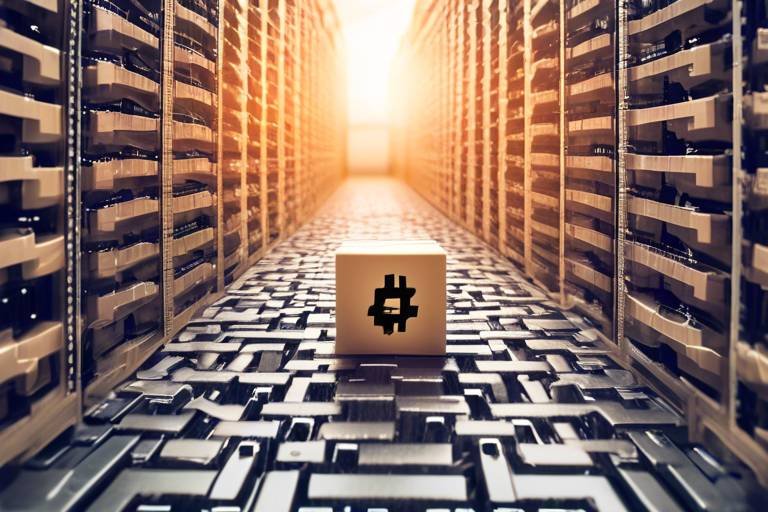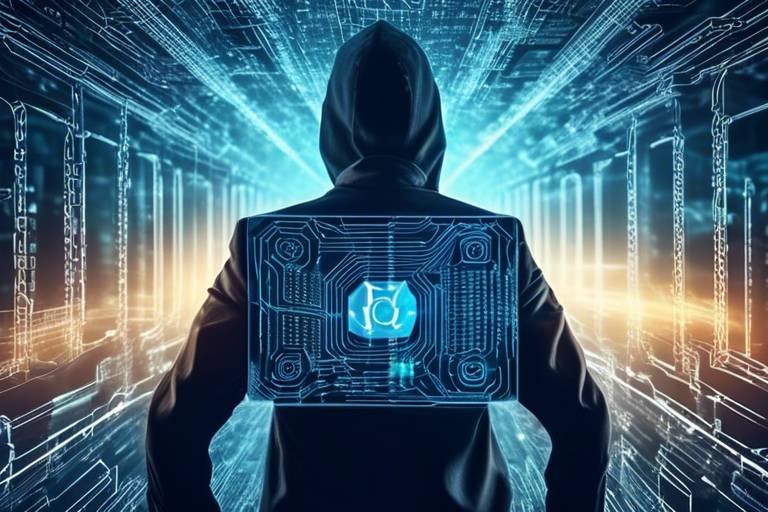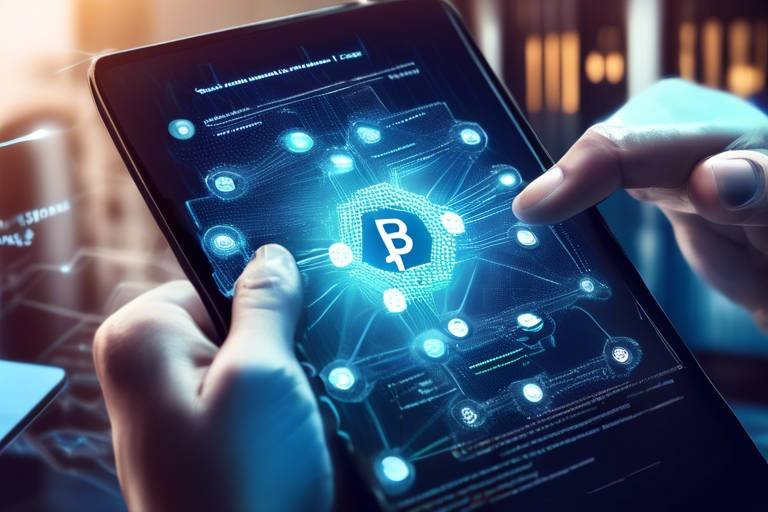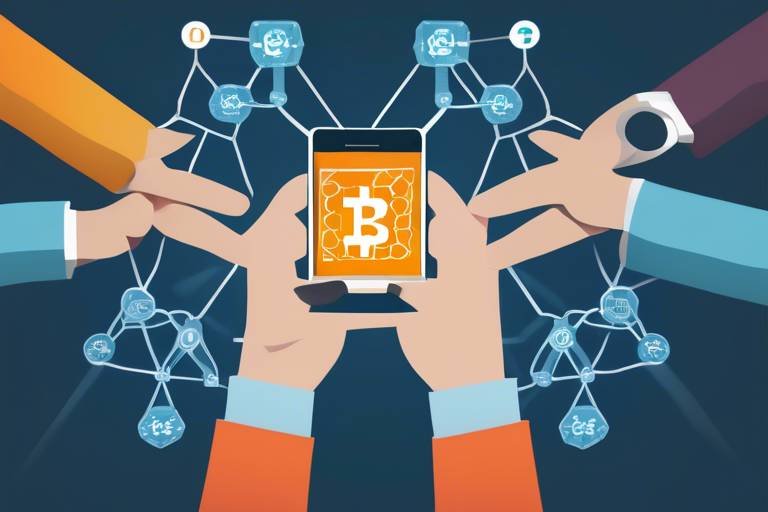The Role of Blockchain in Enhancing Consumer Protections
In today's fast-paced digital world, where transactions happen at the speed of light, ensuring consumer protection has never been more critical. Enter blockchain technology, a game-changer that promises to revolutionize how we conduct business and safeguard our interests. Imagine a world where every transaction is transparent, secure, and trustworthy—sounds like a dream, right? Well, with blockchain, this dream is becoming a reality. This article explores how blockchain technology can improve consumer protections by providing transparency, security, and trust in various transactions, ultimately leading to a more secure marketplace for consumers.
So, what exactly is blockchain? At its core, blockchain is a decentralized digital ledger that records transactions across many computers. This means that no single entity has control over the entire network, making it inherently resistant to fraud and tampering. Think of it as a public library where everyone can see the books, but no one can change the text once it's been written. Each transaction is grouped into a block, and once a block is filled, it is linked to the previous one, creating a chain—hence the name blockchain. This structure not only enhances security but also opens up a world of possibilities for consumer protection.
One of the most significant advantages of blockchain is its ability to provide transparent transaction records. Imagine being able to trace the journey of your favorite product from the manufacturer to your doorstep, knowing every step of its journey is documented and verifiable. This level of transparency can significantly enhance consumer trust. When consumers can see that a company is accountable and that every transaction is recorded, it becomes much harder for fraudulent activities to take place. In fact, businesses that embrace this transparency can foster a loyal customer base that values honesty and integrity.
Another fascinating feature of blockchain is its immutability. Once data is recorded on the blockchain, it cannot be altered or deleted. This is crucial for maintaining accurate consumer records and preventing disputes. For example, if a consumer purchases a product and later claims it was defective, the immutable record can provide clear evidence of the transaction and its details. No more he-said-she-said scenarios! This not only protects consumers but also helps businesses resolve disputes more efficiently.
In a world where data breaches are alarmingly common, blockchain offers a secure way to store consumer data. By leveraging encryption and decentralization, sensitive information is kept safe from unauthorized access. Instead of storing data in a single location, which can be a prime target for hackers, blockchain distributes the data across a network of computers. This means that even if one node is compromised, the rest of the network remains secure. Consumers can breathe a sigh of relief knowing their personal information is protected.
Ever heard of smart contracts? These are self-executing contracts with the terms of the agreement directly written into code. They automate and enforce agreements without the need for intermediaries, such as lawyers or notaries. Imagine buying a house: instead of dealing with a mountain of paperwork and waiting for approvals, a smart contract can handle everything automatically once all conditions are met. This not only streamlines processes but also ensures that consumer rights are upheld, reducing the chances of fraud.
Blockchain can also revolutionize identity verification processes. With traditional systems, consumers often have to provide personal information to multiple organizations, increasing the risk of data breaches. However, with decentralized identity systems, consumers can control their personal information and share only what is necessary. This not only protects consumer privacy but also empowers individuals in their interactions with businesses.
Fraud and scams are unfortunately prevalent in today’s marketplace. However, by leveraging blockchain technology, businesses can significantly reduce instances of these malicious activities. Blockchain provides a transparent and secure platform that makes it easier to identify and mitigate fraudulent activities. By recording every transaction on a public ledger, it becomes much more challenging for scammers to operate undetected.
One of the most exciting capabilities of blockchain is real-time tracking. This feature allows consumers to track products and transactions as they happen. For example, if you order a luxury handbag, you can see exactly where it is at every stage of the delivery process. This capability not only enhances consumer confidence in product authenticity but also helps deter counterfeit goods, which are a massive concern in the retail industry.
As with any new technology, educating consumers about blockchain is vital for its adoption. Awareness campaigns can empower consumers to utilize blockchain for protection. By understanding how blockchain works and its benefits, consumers can make informed decisions and advocate for their rights. Knowledge is power, and in this case, it can lead to a more secure marketplace.
- What is blockchain technology? Blockchain is a decentralized digital ledger that records transactions securely across multiple computers.
- How does blockchain enhance consumer protection? It provides transparency, security, and trust in transactions, reducing fraud and scams.
- What are smart contracts? Smart contracts are self-executing contracts with the terms written into code, automating agreements without intermediaries.
- Can blockchain protect consumer data? Yes, blockchain uses encryption and decentralization to secure consumer data against breaches.

Understanding Blockchain Technology
Blockchain technology is often hailed as a revolutionary force in the digital age, and for good reason. At its core, blockchain is a decentralized ledger that records transactions across multiple computers in such a way that the registered transactions cannot be altered retroactively. This means that once a transaction is added to the blockchain, it becomes part of a permanent record that is visible to all participants in the network. Imagine a public library where every book is a transaction, and once a book is placed on the shelf, it can never be removed or changed. This is the essence of blockchain—an immutable, transparent, and secure way to document exchanges.
One of the fundamental principles of blockchain is its decentralization. Unlike traditional databases that are controlled by a single entity, a blockchain operates on a network of nodes, each of which has a copy of the entire ledger. This structure not only enhances security but also fosters trust among users. When you think about it, it’s like a group of friends sharing a diary; everyone can see what’s written, and no one person can erase or edit the entries without the others noticing. This collective oversight reduces the chances of fraud and manipulation, making it a powerful tool for consumer protection.
Blockchain operates on a few key components that make it effective:
- Blocks: These are the individual units of data that contain transaction information.
- Chains: Blocks are linked together in chronological order, forming a chain of information.
- Nodes: These are the computers that participate in the blockchain network, validating and recording transactions.
- Consensus Mechanisms: These are protocols that ensure all nodes agree on the validity of transactions, such as Proof of Work or Proof of Stake.
The potential applications of blockchain technology in consumer protection are vast. For instance, it can be used to verify the authenticity of products, ensuring that consumers receive what they pay for. It can also streamline supply chains, allowing consumers to track the journey of a product from its origin to their hands. Think of it as a digital fingerprint for every item sold—making it easier to trace back to the source in case of a dispute.
In summary, blockchain technology is not just a passing trend; it is a fundamental shift in how we think about data security and transparency. As we continue to explore its capabilities, it becomes increasingly clear that blockchain can play a crucial role in enhancing consumer protections, making our marketplace safer and more trustworthy.

Transparency in Transactions
In the digital age, where information is just a click away, transparency has become a buzzword that consumers crave. Imagine walking into a store where every product's history is laid bare before you—its origin, its journey, and even its pricing strategy. This is the kind of transparency that blockchain technology can offer. By utilizing a decentralized ledger, blockchain ensures that every transaction is recorded in a way that is visible and accessible to all parties involved. This not only builds trust between consumers and businesses but also holds companies accountable for their actions.
One of the most significant advantages of blockchain is its capability to create an unchangeable record of transactions. Once a transaction is added to the blockchain, it becomes part of a permanent history that cannot be altered or deleted. This characteristic of immutability serves as a powerful deterrent against fraud. For instance, if a company tries to manipulate its transaction history, the discrepancies would be easily detectable by anyone who has access to the blockchain. Thus, consumers can feel more confident knowing that the information they receive is accurate and reliable.
Furthermore, the transparency offered by blockchain can lead to a more informed consumer base. With access to detailed transaction histories, consumers can make better purchasing decisions. They can easily verify the authenticity of products, scrutinize pricing, and even check the ethical practices of the companies they support. This level of insight can foster a sense of empowerment among consumers, making them active participants rather than passive recipients of information.
To illustrate the impact of transparency in transactions, consider the following table that compares traditional transaction methods with blockchain-enabled transactions:
| Aspect | Traditional Transactions | Blockchain Transactions |
|---|---|---|
| Visibility | Limited to involved parties | Publicly accessible to all |
| Data Alteration | Possible without consent | Immutable once recorded |
| Trust Level | Dependent on intermediaries | Built-in through transparency |
| Consumer Empowerment | Minimal | High, with access to information |
Moreover, this transparency also encourages businesses to maintain higher standards. Knowing that their actions are subject to public scrutiny, companies are more likely to engage in ethical practices and provide quality products. This creates a healthier marketplace where consumers can shop with confidence, leading to a win-win situation for both parties.
In conclusion, the transparency offered by blockchain technology is not just a luxury; it's a necessity in today's marketplace. It promotes accountability, builds trust, and empowers consumers to make informed decisions. As more businesses adopt blockchain solutions, we can expect to see a significant shift towards a more transparent and secure shopping experience.

Immutable Records
When we think about the concept of immutability in blockchain, it’s like having a diary that no one can ever erase or edit. Once you write something down, it’s there forever, and that’s exactly how blockchain operates. This feature is pivotal in maintaining accurate consumer records, as it ensures that once a transaction is recorded, it cannot be altered or deleted. Imagine the peace of mind that comes with knowing your purchase history is securely locked in a digital vault, immune to tampering. This level of security is especially crucial in today’s world, where disputes over transactions can lead to frustrating and lengthy processes.
Let’s break down why immutable records are essential for consumer protection:
- Accuracy: With immutable records, consumers can trust that the information they see is correct. There’s no room for error or manipulation, which is a breath of fresh air in a marketplace often riddled with misinformation.
- Dispute Resolution: In the event of a disagreement, having an unchangeable record means that both parties can refer back to the original transaction. This transparency can save time, money, and stress, making it easier to resolve issues amicably.
- Accountability: Businesses are held accountable for their actions. If a company makes a mistake or engages in fraudulent behavior, the immutable record will expose this, allowing consumers to make informed decisions.
Furthermore, the immutability of blockchain records extends beyond simple transactions. It can also be applied to various sectors, such as healthcare, where patient records need to be reliable and tamper-proof. Imagine a world where your medical history is securely stored on a blockchain, ensuring that only authorized personnel can access it, and any changes made are logged and visible. This not only enhances privacy but also builds trust between patients and healthcare providers.
In essence, the immutability of blockchain records is a game-changer for consumer protection. It offers a robust framework that promotes transparency and accountability, fostering a marketplace where consumers can shop with confidence. As we continue to embrace this technology, the potential for enhancing consumer rights and protections becomes increasingly clear.
Q1: What does immutability mean in the context of blockchain?
A1: Immutability refers to the property of blockchain that prevents data from being altered or deleted once it has been recorded. This ensures that transaction histories are permanent and trustworthy.
Q2: How does immutability benefit consumers?
A2: It provides consumers with accurate records of transactions, simplifies dispute resolution, and holds businesses accountable for their actions, ultimately enhancing trust in the marketplace.
Q3: Can immutable records be hacked?
A3: While no system is completely immune to hacking, the decentralized nature of blockchain and its cryptographic security make it extremely difficult for hackers to alter immutable records.
Q4: In which industries can blockchain's immutability be applied?
A4: Blockchain's immutability can be applied across various industries, including finance, healthcare, supply chain management, and more, where accurate and trustworthy records are crucial.

Consumer Data Security
In today's digital world, where data breaches and cyber threats loom large, has become a paramount concern. Blockchain technology emerges as a robust solution to these challenges by offering a secure environment for storing and managing sensitive consumer information. At its core, blockchain employs advanced encryption techniques that safeguard data from unauthorized access, ensuring that only the rightful owners can control their information. This decentralized approach means that rather than relying on a single point of failure, data is distributed across a network of computers, making it significantly harder for hackers to compromise the system.
One of the standout features of blockchain is its ability to create a trustless environment. This means that transactions can occur without the need for a central authority or intermediary, which often serves as a vulnerability in traditional systems. Imagine a world where you can conduct transactions, share personal information, or even sign contracts without the fear of data being manipulated or stolen. This is not just a dream; it's a reality that blockchain technology is paving the way for. With the implementation of blockchain, consumers can have peace of mind knowing that their data is not only secure but also in their control.
To further illustrate how blockchain enhances consumer data security, consider the following key points:
- Encryption: Data stored on the blockchain is encrypted, which adds an extra layer of security. Even if someone gains access to the blockchain, they would find it nearly impossible to decipher the encrypted data without the proper keys.
- Decentralization: Unlike traditional databases that are controlled by a single entity, blockchain distributes data across multiple nodes, making it resilient against attacks.
- Access Control: Consumers can manage who has access to their data. They can grant or revoke permissions, ensuring that only trusted parties can view their information.
Moreover, the transparency inherent in blockchain technology allows consumers to track how their data is used. This means that businesses must adhere to strict protocols regarding data handling, which can deter potential misuse. For instance, if a company wants to access consumer data, it must do so with explicit consent, and consumers can verify that their data is being used appropriately. This level of accountability not only builds trust between consumers and businesses but also fosters a culture of ethical data use.
In conclusion, as we navigate through an era where data security is more crucial than ever, blockchain technology stands out as a beacon of hope. By providing a secure, transparent, and decentralized framework for managing consumer data, it empowers individuals to take control of their personal information. As consumers become more aware of these benefits, the adoption of blockchain for data security will likely increase, leading to a more secure and trustworthy digital marketplace.

Smart Contracts
Smart contracts are one of the most exciting innovations that blockchain technology has to offer. Imagine having a digital agreement that executes itself when certain conditions are met, without the need for a middleman. It’s like having a vending machine for contracts; you put in your requirements, and out comes the result, as long as you’ve followed the rules! This automation not only streamlines processes but also ensures that consumer rights are upheld in a way that traditional agreements often fail to do.
At their core, smart contracts are simply self-executing contracts with the terms of the agreement directly written into lines of code. They operate on blockchain networks, which means they inherit all the benefits of blockchain technology—like security, transparency, and immutability. Once deployed, these contracts cannot be altered, which protects both consumers and businesses from potential disputes. For instance, if a consumer purchases a product online, a smart contract can automatically release payment to the seller once the product has been confirmed as delivered. This eliminates the need for trust in the transaction, as the contract enforces the agreement.
Moreover, smart contracts can significantly reduce the risk of fraud. In a traditional contract scenario, there’s always a chance of one party not fulfilling their obligations. However, with smart contracts, the conditions are clear and automatically enforced. If the conditions aren’t met, the contract simply won’t execute. This creates a level of accountability that is often lacking in conventional agreements. As a result, consumers can feel more secure knowing that their rights are protected by technology rather than relying solely on human trust.
Here are some key benefits of smart contracts in enhancing consumer protections:
- Efficiency: Smart contracts automate processes, which can save time and reduce costs associated with manual contract management.
- Transparency: All parties involved can view the contract terms and the execution process, leading to greater trust.
- Security: With encryption and decentralized storage, smart contracts are less vulnerable to hacking and fraud.
- Dispute Resolution: The immutable nature of blockchain means that once a contract is executed, it’s nearly impossible to dispute the terms.
In summary, smart contracts represent a leap forward in how consumers can engage in transactions. They not only simplify and secure the process but also enhance trust and transparency in the marketplace. As consumers become more aware of these technologies, we can expect a shift towards more automated and secure transactions, ultimately leading to a safer shopping experience for everyone.
What are smart contracts?
Smart contracts are self-executing contracts with the terms of the agreement directly written into code that runs on a blockchain.
How do smart contracts work?
They automatically execute and enforce the terms of an agreement when predefined conditions are met, eliminating the need for intermediaries.
Are smart contracts secure?
Yes, smart contracts are secured by blockchain technology, which provides encryption and decentralization, making them less vulnerable to fraud.
Can smart contracts be changed after deployment?
No, once a smart contract is deployed on the blockchain, it cannot be altered, ensuring that the terms remain intact.

Decentralized Identity Verification
In today's digital age, protecting our identity is more crucial than ever. With the rise of data breaches and identity theft, traditional methods of identity verification often fall short, leaving consumers vulnerable to fraud. Enter , a game-changing approach made possible by blockchain technology. This innovative system allows individuals to take control of their personal information, ensuring that it remains secure and private. Imagine being able to verify your identity without handing over your entire life story to every service provider you encounter!
Decentralized identity verification works by utilizing blockchain's inherent features of transparency and security. Instead of relying on a central authority to verify identities, blockchain enables users to create a digital identity that is both secure and verifiable. This digital identity can be shared selectively, allowing consumers to provide only the necessary information required for a transaction. For instance, if you're signing up for a new service, you can verify your age without revealing your full date of birth. This minimizes the risk of sensitive data falling into the wrong hands.
One of the most significant advantages of this system is the empowerment it gives consumers. In a world where data is often exploited, decentralized identity verification allows individuals to reclaim their privacy. By using cryptographic techniques, consumers can prove their identity without exposing their entire personal data. This not only enhances privacy but also builds trust between consumers and businesses. When a company can verify a customer's identity without accessing unnecessary personal information, it fosters a sense of security and confidence.
Moreover, decentralized identity verification can streamline processes across various sectors, from finance to healthcare. For example, in the financial industry, customers can easily verify their identity when opening a new account without the need for lengthy paperwork or in-person visits. This not only saves time but also reduces operational costs for businesses. In healthcare, patients can share their medical history securely with new providers without the fear of data breaches, leading to better care and outcomes.
As we move towards a more digital future, the importance of educating consumers about decentralized identity verification cannot be overstated. Awareness campaigns can play a pivotal role in ensuring that individuals understand the benefits and functionalities of this technology. By empowering consumers with knowledge, we can help them make informed decisions about their personal data and how they choose to share it.
In conclusion, decentralized identity verification represents a significant leap forward in consumer protection. By giving individuals control over their personal information, enhancing privacy, and streamlining verification processes, blockchain technology is paving the way for a safer digital landscape. As consumers, embracing this technology can lead to a more secure and trustworthy marketplace.
- What is decentralized identity verification?
Decentralized identity verification is a system that allows individuals to manage their own identity information securely using blockchain technology, eliminating the need for central authorities. - How does it enhance consumer privacy?
This system enables consumers to share only the necessary information for verification, reducing the risk of sensitive data exposure. - Can decentralized identity verification be used in different industries?
Yes, it can be applied across various sectors, including finance, healthcare, and e-commerce, to streamline identity verification processes. - What are the benefits of using blockchain for identity verification?
Blockchain provides enhanced security, transparency, and control over personal data, fostering trust between consumers and businesses.

Reducing Fraud and Scams
In today's digital age, fraud and scams are becoming increasingly sophisticated, making it essential for consumers to find effective ways to protect themselves. This is where blockchain technology steps in as a game changer. By leveraging the unique features of blockchain, businesses can significantly reduce instances of fraud and scams, creating a safer marketplace for consumers. But how exactly does blockchain tackle these issues? Let’s dive deeper.
First and foremost, one of the standout features of blockchain is its ability to provide real-time tracking of products and transactions. Imagine being able to trace the journey of a product from its origin to your doorstep, all recorded on a transparent ledger. This capability not only enhances accountability but also deters counterfeit goods. When consumers can verify the authenticity of a product, it builds trust and confidence in their purchases. For instance, if you're buying luxury goods, knowing that you can trace their origin through a blockchain record makes you less susceptible to scams.
Moreover, the transparency offered by blockchain can help identify suspicious activities. When transactions are recorded on an immutable ledger, it becomes much easier to spot irregularities. Businesses can monitor transactions in real time, allowing them to quickly react to potential fraud. This is akin to having a security camera on every corner of a store; the presence of surveillance alone can deter thieves from attempting a robbery.
Another aspect worth mentioning is the role of smart contracts in reducing fraud. These self-executing contracts with the terms of the agreement directly written into code can automate and enforce agreements without the need for intermediaries. For example, when you purchase a ticket for a concert through a smart contract, the contract ensures that the ticket is valid and that the funds are released only when the event starts. This not only streamlines the purchasing process but also minimizes the risk of scams, as the conditions are clear and cannot be manipulated.
Additionally, blockchain can facilitate the creation of a more secure identity verification process. Traditional methods often rely on centralized databases that can be vulnerable to breaches. However, with blockchain, consumers have control over their personal information, allowing them to share only what is necessary with businesses. This decentralized identity verification can significantly reduce the risk of identity theft and fraud, empowering consumers to manage their data securely.
To sum it up, blockchain technology is not just a buzzword; it is a powerful tool that can help reduce fraud and scams in various ways:
- Real-time tracking of products enhances authenticity.
- Transparency in transactions helps identify irregularities.
- Smart contracts automate agreements and minimize risks.
- Decentralized identity verification protects personal information.
As consumers become more aware of these benefits, the adoption of blockchain technology will likely grow, leading to a more secure marketplace. It's like having a digital shield that not only protects but also empowers consumers to make informed decisions. So, the next time you make a purchase, remember that blockchain might just be the silent guardian ensuring your transaction is safe and secure.
Q: How does blockchain technology help in reducing fraud?
A: Blockchain provides transparency and real-time tracking of transactions, making it easier to identify and prevent fraudulent activities.
Q: What are smart contracts?
A: Smart contracts are self-executing contracts with the terms directly written into code, which automate agreements and reduce the need for intermediaries.
Q: Can blockchain protect my personal information?
A: Yes, blockchain allows for decentralized identity verification, giving consumers control over their personal data and minimizing the risk of identity theft.

Real-Time Tracking
Imagine you're eagerly waiting for a package to arrive, tracking its journey from the warehouse to your doorstep. With blockchain technology, this experience can be transformed into a seamless and transparent process. is one of the most exciting features that blockchain brings to the table, allowing consumers to monitor their products at every stage of the supply chain.
How does this work? Well, blockchain operates on a decentralized ledger system that records every transaction in a secure and transparent manner. Each time a product changes hands—be it from manufacturer to distributor, or distributor to retailer—this movement is logged on the blockchain. This means that consumers can access a complete history of their product, from its origin to its current location. This level of transparency not only builds trust but also empowers consumers to make informed decisions.
Consider this: if you’re purchasing a luxury handbag, knowing its entire journey can assure you that it’s not a counterfeit. With blockchain, you can verify the authenticity of the product by tracing its history. This capability is crucial in industries plagued by fraud, such as luxury goods and pharmaceuticals. By reducing the chances of counterfeit products entering the market, real-time tracking enhances consumer confidence and satisfaction.
Furthermore, the ability to track products in real-time can significantly reduce the response time in case of issues. For example, if a product is delayed or lost, both consumers and businesses can quickly identify the problem and take corrective action. This not only improves the overall customer experience but also fosters a sense of accountability among businesses.
To illustrate the impact of real-time tracking, let’s take a look at a simple table that summarizes its benefits:
| Benefit | Description |
|---|---|
| Enhanced Transparency | Consumers can see the entire journey of their products, increasing trust. |
| Fraud Prevention | Real-time tracking helps identify counterfeit products before they reach consumers. |
| Improved Customer Experience | Quick resolution of issues related to delays or lost products. |
In summary, real-time tracking enabled by blockchain technology is a game-changer for consumer protection. It not only enhances transparency and trust but also actively combats fraud and improves the overall shopping experience. As more businesses adopt this technology, consumers can expect a future where they have complete control and visibility over their purchases, making for a more secure marketplace.
- What is real-time tracking in blockchain? Real-time tracking refers to the ability to monitor the movement and status of products through a decentralized ledger, providing transparency and accountability in the supply chain.
- How does real-time tracking prevent fraud? By allowing consumers to verify the authenticity and origin of products, real-time tracking reduces the likelihood of counterfeit goods entering the market.
- Can I track my package using blockchain? Yes! If the retailer uses blockchain technology for their supply chain, you can track your package in real-time from its origin to your doorstep.

Consumer Education and Awareness
In today's fast-paced digital world, consumer education is more important than ever, especially when it comes to understanding emerging technologies like blockchain. Many people may have heard the term "blockchain" tossed around in conversations, but how many truly grasp its significance and implications for consumer protection? The answer is not enough. To harness the full potential of blockchain, consumers need to be educated about its benefits and functionalities. Imagine walking into a store and feeling completely confident that every product you’re buying is authentic, thanks to the transparency provided by blockchain. Sounds appealing, right?
One of the primary barriers to the widespread adoption of blockchain technology is a lack of awareness. Many consumers remain unaware of how blockchain can protect their interests and enhance their shopping experiences. This is where education plays a crucial role. By understanding the fundamentals of blockchain, consumers can make informed decisions that safeguard their rights and investments. Knowledge is power, and in this case, it can lead to a more secure marketplace.
To facilitate this education, various stakeholders, including businesses, educational institutions, and governmental organizations, should collaborate to create comprehensive awareness campaigns. These campaigns should aim to demystify blockchain technology and showcase its practical applications in everyday life. Here’s how they can do it:
- Workshops and Seminars: Hosting events where consumers can learn about blockchain in a hands-on environment can significantly boost understanding. These sessions can cover topics such as how blockchain works, its benefits, and real-world applications.
- Online Resources: Developing user-friendly websites and online courses that explain blockchain concepts in simple terms can cater to a wider audience. Infographics, videos, and interactive content can make learning engaging.
- Social Media Campaigns: Utilizing platforms like Facebook, Twitter, and Instagram to share bite-sized educational content can reach a vast number of consumers quickly. Engaging posts that explain blockchain's benefits can spark curiosity and encourage further learning.
Moreover, businesses that adopt blockchain technology should also take the initiative to educate their customers. By providing clear information about how they use blockchain to enhance consumer protections, businesses can build trust and loyalty. For instance, if a company implements blockchain to guarantee the authenticity of its products, sharing this information transparently can reassure consumers about their purchases.
In conclusion, are vital components in the successful integration of blockchain technology into the marketplace. By empowering consumers with knowledge, we can create a more informed public that not only understands but also embraces the advantages of blockchain. As consumers become more aware of their rights and the tools available to protect them, we can expect a significant shift towards a more secure and transparent marketplace.
To further assist our readers, here are some common questions about consumer education and blockchain:
| Question | Answer |
|---|---|
| What is blockchain? | Blockchain is a decentralized digital ledger technology that records transactions across many computers securely. |
| How can blockchain protect consumers? | It enhances transparency, reduces fraud, and provides secure data storage, ensuring consumer rights are upheld. |
| Why is consumer education important? | Educated consumers can make informed decisions, understand their rights, and utilize technologies like blockchain effectively. |
| How can I learn more about blockchain? | Look for workshops, online courses, and resources provided by reputable organizations or educational institutions. |
Frequently Asked Questions
- What is blockchain technology?
Blockchain technology is a decentralized digital ledger that records transactions across many computers securely. It ensures that the recorded transactions cannot be altered retroactively, providing a transparent and trustworthy system for various applications, including consumer protection.
- How does blockchain enhance consumer protections?
Blockchain enhances consumer protections by offering transparency, security, and trust in transactions. By providing immutable records and decentralized identity verification, consumers can feel more secure knowing their information is protected and their transactions are accounted for.
- What are immutable records in blockchain?
Immutable records refer to the unchangeable nature of data once it is recorded on the blockchain. This means that once a transaction is verified and added to the blockchain, it cannot be altered or deleted, ensuring that consumer records remain accurate and disputes can be resolved easily.
- How does blockchain protect consumer data?
Blockchain protects consumer data through encryption and decentralization. By distributing data across a network of computers rather than storing it in a single location, the risk of data breaches is significantly reduced, keeping sensitive information safe from unauthorized access.
- What are smart contracts?
Smart contracts are self-executing contracts with the terms of the agreement directly written into code. They automate processes and enforce compliance without the need for intermediaries, ensuring that consumer rights are upheld and reducing the potential for fraud.
- How can blockchain help reduce fraud?
Blockchain can help reduce fraud by enabling real-time tracking of products and transactions. This capability allows consumers to verify the authenticity of goods and services, which deters counterfeit products and builds confidence in the marketplace.
- Why is consumer education about blockchain important?
Consumer education is crucial for the adoption of blockchain technology. By understanding how blockchain works and its benefits, consumers can make informed decisions and fully utilize the technology to protect themselves from fraud and scams.



















